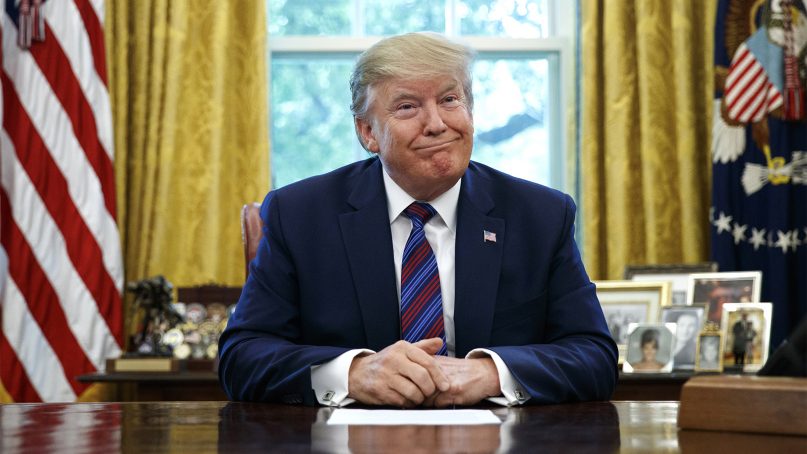(RNS) — In a recent piece from The Atlantic, Peter Wehner tries to answer a question that befuddles reporters, preachers and political commentators alike in recent years.
Why do white evangelicals remain so loyal to President Donald Trump? And why are so many evangelical thought leaders surprised by this loyalty?
Wehner points to a survey showing that seven out of ten white evangelicals approve of Donald Trump’s job performance, despite his personal improprieties and his parade of not so thinly veiled racist statements.
He quotes Ralph Reed, founder of the Faith and Freedom Coalition, saying that evangelicals adore the president: “There has never been anyone who has defended us and who has fought for us, who we have loved more than Donald J. Trump. No one!”
The support for Trump comes with a price, argues Wehner. Evangelicals may have helped win the White House, but their public witness is suffering.
“There’s a very high cost to our politics for celebrating the Trump style, but what is most personally painful to me as a person of the Christian faith is the cost to the Christian witness,” he writes.
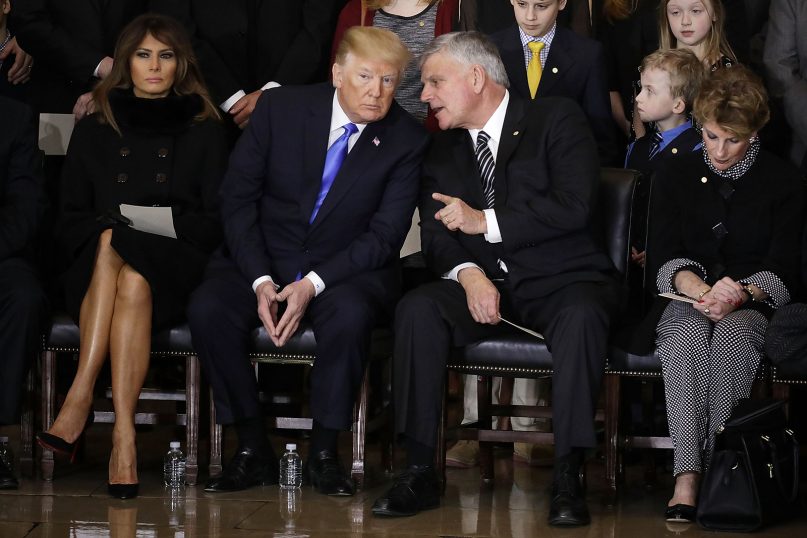
President Trump speaks to the Rev. Franklin Graham as they attend a ceremony to honor the late Rev. Billy Graham in the U.S. Capitol rotunda on Feb. 28, 2018, in Washington. (Chip Somodevilla/Pool via AP)
Wehner joins a chorus of other evangelical thought leaders who bemoan the tight relationship between the current occupant of the White House and their follow white evangelicals.
He, like other evangelical elites, have distanced themselves from Trump. Yet most white evangelicals in the pews continue to move closer to the president.
Why is this?
Geography.
Most evangelical elites live in or close to urban areas. They travel to conferences and speaking events that are also in urban areas, all the while engaging with other evangelicals who, more often than not, are urban.
I suspect this gives them a skewed view of what evangelicals think — at least when it comes to politics.
Urban, white evangelicals are a small portion of the evangelical population as a whole, and their politics look different from the politics of the rest of white evangelicals in the United States.
Evangelicals in urban areas are a decidedly small minority — just one in ten urban dwellers. By contrast, one in four rural dwellers is evangelical.
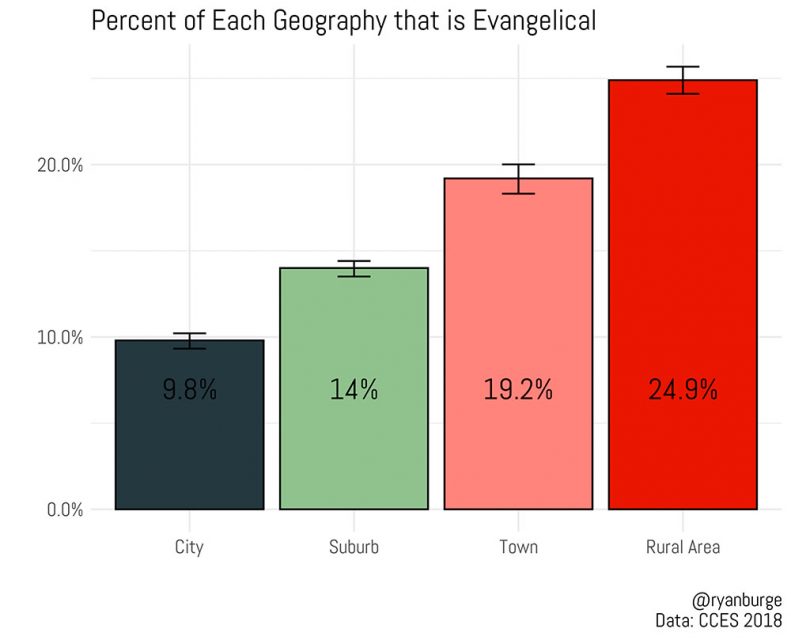
“Percent of Each Geography that is Evangelical” Graphic by Ryan Burge
However, that doesn’t tell the whole story. According to the 2010 Decennial Census, 80.7% of Americans lived in urban areas. Does that 10% of urban white evangelicals translate to a greater total number of evangelicals than those living in rural areas?
No.
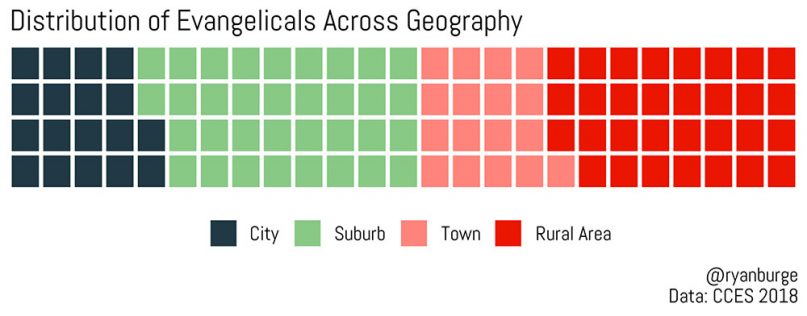
“Distribution of Evangelicals Across Geography” Graphic by Ryan Burge
At least, not according to the Cooperative Congressional Election Study.
An analysis of that study found that about a third (34%) of all white evangelicals lives in the suburbs, another third (31%) lives in rural areas, while about a fifth (18%) lives in cities. A similar number lives in small towns.
These figures may help explain why many of the fastest growing evangelical megachurches are in the suburbs surrounding major urban centers. And those churches overall are thriving: Nearly three in five of them grew over the past five years, compared to three in five churches overall that are declining.
So, when we think of evangelicals, we must begin to update our perception: a huge and growing block of them is suburban.
And the folks in those churches are among the most devout: 56.3% of them attends church at least once a week. That’s nearly five points higher than rural evangelicals.
White suburban evangelicals are plentiful, and they are active. That’s a potent mix.
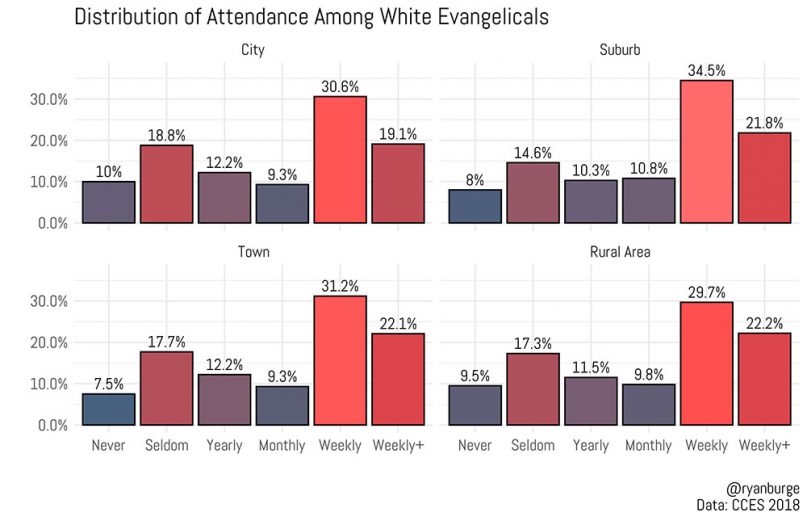
“Distribution of Attendance Among White Evangelicals” Graphic by Ryan Burge
All this affects politics.
The impact of the urban/rural divide on electoral outcomes is one of the most important stories of modern politics.
The Democrats dominate in the largest metros, while the GOP has an unmistakable grip on rural America. Hillary Clinton won three-quarters of the vote in San Francisco, two thirds in the Los Angeles area, 63.7% of voters in Chicagoland, and three in five of those who voted in New York City.
However, Trump won every single county in Oklahoma, all but one in Kansas and lost just two (urban) counties in Kentucky. If these two geographies stand at the edges of the political spectrum, then the suburbs are the battleground.
A recent piece at Vox proclaimed: “The suburbs abandoned Republicans in 2018, and they might not be coming back.”
For that to be true, the Democrats must be able to gain some ground among white evangelicals who are plentiful in the suburbs. The data says that this will be a heavy lift.
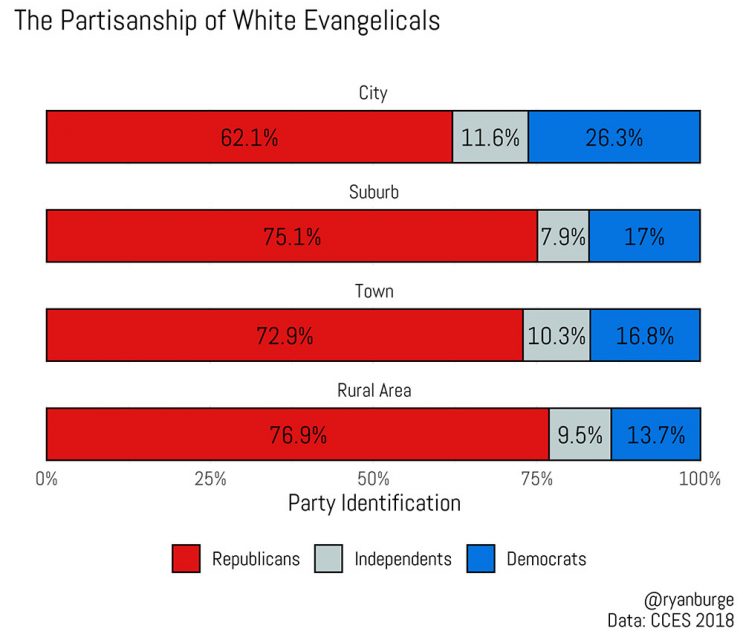
“The Partisanship of White Evangelicals” Graphic by Ryan Burge
Urban evangelicals, it turns out, are surprisingly diverse. Just over six in 10 (62%) are Republicans. The rest are either Democrats (26%) or independent (11.6%).
In the suburbs, Republicans rule among evangelicals. Seventy-five percent of suburban evangelicals identify as Republican, as do 77% of rural evangelicals.
By contrast, evangelical Democrats in the suburbs are outnumbered by more than four to one. In rural areas, that ratio is more like five to one. In urban areas, the ratio is more like two to one.
Urban evangelicals have some room for political diversity. Suburban and rural evangelicals do not.
One of the most striking things about Wehner’s piece is that he does not appear to have actually spoken to an evangelical Republican, or at least not an ordinary voter.
Wehner did exchange emails with someone who had interviewed evangelicals at a Trump rally in Florida. But he had not spoken to Trump’s white evangelical base directly.
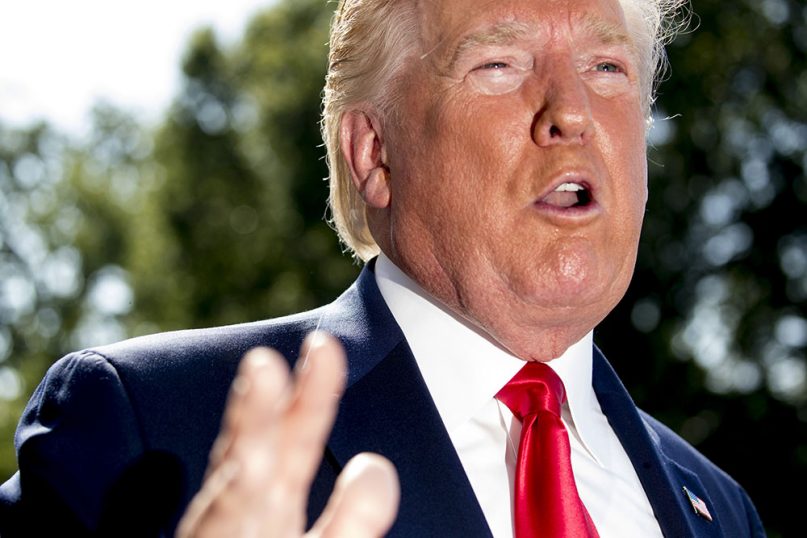
President Trump speaks to members of the media on the South Lawn of the White House in Washington on July 12, 2019. (AP Photo/Andrew Harnik)
This reminds us of the famous political maxim (proven to be untrue), that in the wake of President Nixon’s electoral victory, the film critic Pauline Kael said that Nixon couldn’t have won; she didn’t know anybody who voted for him.
The world of the evangelical opinion leader seems to be greatly divorced from the political opinions of the average white evangelical in the pew on Sunday morning.
Evangelical thought leaders are in a tough spot. They must continue to make their religious tradition look racially and politically diverse — and some urban churches do look like that.
However, what may be happening is reminiscent of Pauline Kael — many influential evangelicals don’t have a lot of direct contact with the average white evangelical who lives in suburban or rural America.
The data is clear: White evangelicals are overwhelmingly Republican, and they strongly support Donald Trump and his policies. It’s becoming nearly impossible to be white and evangelical and anything other than a Republican.
So, the next time you read an op-ed about how white evangelical churches are pushing back against the Republican establishment or challenging Trump’s policies, understand that these are outliers.
Huge majorities of suburban and rural evangelical churches stand in near-unanimous support of the current administration — no matter what evangelical leaders try to tell you.
(Ryan Burge teaches political science at Eastern Illinois University and is co-founder of Religion in Public. The views expressed in this commentary do not necessarily represent those of Religion News Service.)
